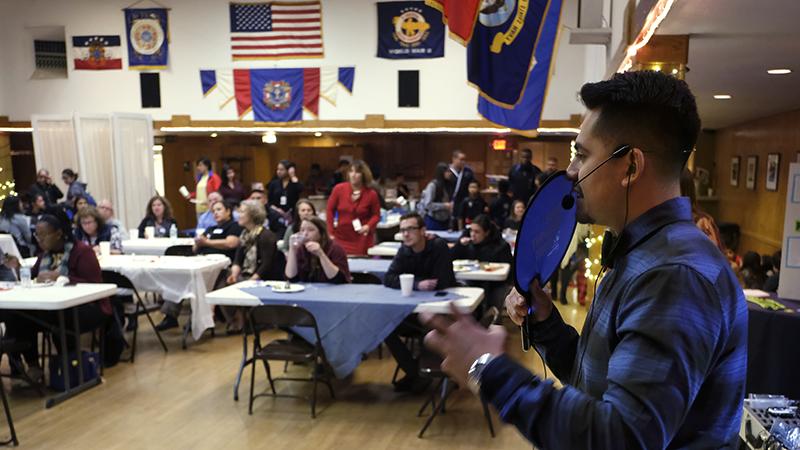What Is Language Justice?
Leer en español
Sheridan, Colo. Photo by Joe Mahoney/Special to The Colorado Trust
By Kristin Jones
The photograph above shows Luis Gomez interpreting at an end-of-year gathering for a group of residents called Sheridan Rising Together for Equity. The Colorado Trust is supporting this resident team through its Community Partnerships strategy. The party, which also had cake, punch and a kids’ kung fu demonstration, was celebrating the residents’ efforts toward health and justice in Sheridan, a city on the southwest border of Denver. The team has been a launch pad for residents running for elected office, and for collective work that has encouraged the local school district to incorporate more culturally sensitive learning.
Without Gomez, they wouldn’t be able to do half as much as they’ve done. That’s because without his and others’ interpreting, they couldn’t talk to each other. Some speak only English, some only Spanish, and some are bilingual.
Here’s how it works: When somebody speaks in English, Gomez simultaneously whispers the Spanish interpretation into his mic, which feeds the headsets of everyone in the room. There’s another person whispering the English interpretation when somebody speaks Spanish.
Gomez works for the Community Language Cooperative, a Denver-based organization providing training, interpretation and translation services. The group’s work has been essential for the diverse teams in the Community Partnerships strategy. The teams are engaged in long-term work to dig up the root causes of inequities in their communities, and to propose and implement solutions. They need to be able to talk to each other—and to do it without each meeting taking twice as long, or more.
In Fort Morgan, for example, training provided by the cooperative allows French, Spanish, Somali and English speakers to all participate in their preferred language. All participants wear headsets; they contribute to and hear the meeting in whatever language they understand best.
The same dynamic works just as well when it’s nonprofits, rather than neighbors, collaborating. A cohort of 18 diverse organizations that advocate for health equity in Colorado, with support from The Trust, has been using the cooperative for years to interpret at its meetings.
Rosa Guzman-Snyder founded the cooperative with her sister Indira Guzman, who has also worked as an organizer with the Sheridan group. Guzman-Snyder says what the cooperative aims for isn’t just interpretation and translation; it’s language justice.
Guzman-Snyder stepped down from the organization in June 2018 to take a role directing community development for the National Center for Families Learning, an educational nonprofit. But before she left, she spoke to me about the Community Language Cooperative’s work. Here’s an edited version of our conversation.
What do you mean by language justice?
It really comes down to power.
Interpretation often isn’t offered in clinics or courthouses or schools. You have kids interpreting for their parents. We’re in Denver, and there are a lot of folks trying to make language access a thing. We go a step further and look at power structures.
My parents are Mexican immigrants. My mom learned English. My dad understands [English] more or less but he doesn’t speak English.
My dad was a pastor. He’s retired now. When he preached in Spanish, we saw him in his fullness. He was a very dynamic speaker. But the moment he entered any [English-speaking] institution—a school, or a doctor’s office—his shoulders would sag and his face would drop. You’d notice that sense of powerlessness.
So how do you change that power dynamic?
We talk a lot about making sure that language isn’t an afterthought. If you have a space where you’re going to lead a talk about mental health or STDs, making sure that people are culturally competent. Maybe folks speak Spanish, but they don’t understand how issues intersect with culture.
Ninety percent of the interpreters we have are children of Mexican immigrants, or immigrants themselves, or refugees. They know how to navigate this.
In our work in communities, we work on creating strong bonds, with clear lines about confidentiality. Folks aren’t going to open up to us unless they believe it’s safe. We are doing things so that the interpreter doesn’t take up space or take up time. We’re making sure the power falls into the hands of the community.
Why are the headsets such an important tool?
When everyone has a headset, everyone feels free to speak up. No language is dominant over another. You’re not feeling like the non-English speakers are having to be provided with an extra service.
What usually happens in a traditional space is that only the non-dominant speakers have headsets. Any time they want to speak up, the interpreter has to speak up for them.
If everyone has a headset, you’re not stopping for anybody. That sends a message that “yes, this space is for me, the space is conducive to my voice being heard.”
Language is power, and if folks feel like their language is considered less, the odds of them speaking up or advocating for changes in their community are minimal. They feel like, “my voice doesn’t really have a place here, because I don’t speak the language.”
What’s the mission that drives your work?
I think there’s definitely a sense that we need to let folks know how systems work and let folks navigate systems in the U.S.
That’s different from making folks feel like they’re not complete. When we come into a space or a board room, we want folks to come in with their wholeness, their culture, their language, their children. That enriches everyone.

